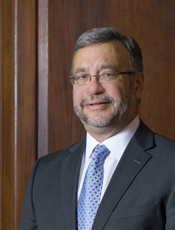Messy disputes in divorces can have lasting impacts on spouses and their children.
Sometimes, litigation in a courtroom is the best way to go, says Harrisonburg attorney P. Marshall Yoder, a graduate of Eastern Mennonite University’s (EMU) Center for Justice and Peacebuilding and adjunct professor at EMU.
But more and more couples are finding the collaborative practice, a form of alternative dispute resolution conducted outside of court, is a better approach to solving their differences, Yoder said.

“One of the big advantages is people retain control of their disputes,” he said. “And they decide the outcomes rather than have a court decide it for them or having, frankly, lawyers that are going to look at it in a purely legal vacuum. … People retain control of their disputes, and they can decide what is best for them.”
Yoder, of Wharton, Aldhizer and Weaver, was named to Virginia Business magazine’s Legal Elite for 2012.
The listing appeared in the magazine’s December issue and featured a profile of Yoder in which he discussed alternative dispute resolution.
Most cases Yoder handles using the collaborative approach are domestic, though he does use it for business disagreements.
Couples who decide to take the alternative approach agree to resolve their dispute outside of court. Often, other outside parties are brought into the process, such as financial planners and mental health professionals, to help move the process forward, Yoder said.
The method started to be used in the Harrisonburg area in 2006, he said, and it’s becoming more prevalent.
“I would say the vast majority of cases probably wind up in court or resolved some other way, but it is growing here,” he said.
It allows for a more holistic approach to solving problems rather than being strictly legal, he added.
“We often say a family doesn’t stop being family because there’s been a divorce,” Yoder said. “It’s going to be a different kind of family, but there’s still a family there.”
Courtesy Daily News Record, Jan. 12, 2013